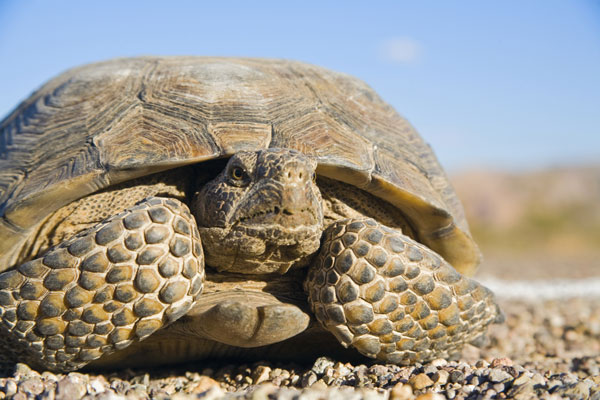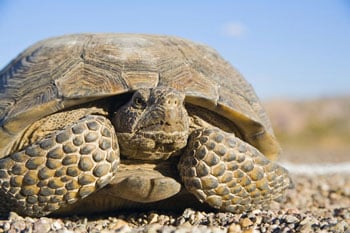Petition launched on MoveOn.org to stop a federal plan to euthanize remaining tortoises.
UPDATE: USFWS responds to desert tortoise euthanization media reports.
August 26, 2013: Recent media reports regarding the status of desert tortoises at the Desert Tortoise Conservation Center (DTCC) have implied that the FWS is currently euthanizing desert tortoises at the facility. We want the public to know that the FWS is not euthanizing healthy tortoises.
The DTCC was established in 1990 to receive wild tortoises in harm’s way from development and has taken in unwanted pets since 1996. Over 1,000 tortoises arrived at the DTCC each year, and approximately 98 percent of those are surrendered or stray pets. Science-based protocols developed for desert tortoises brought to the DTCC have been instrumental in helping the FWS maintain a healthy population of desert tortoise in the wild. Managing to recover desert tortoise, a threatened species, is a complex task in which all options need to be considered, and all risks and benefits to the species must be assessed.
Many pet tortoises, unfortunately, are diseased or otherwise in poor health, and run the risk of spreading disease to wild tortoises. These tortoises cannot be relocated to the wild, or otherwise contribute to recovery of the desert tortoise population. Sometimes euthanasia of unhealthy pet tortoises is necessary, but only as last resort, and only after we evaluate other options. All healthy tortoises at the DTCC will be relocated to sites that will support the recovery of the species.
Progress is being made on translocating the healthy DTCC tortoise population to the wild. A Programmatic Environmental Assessment is complete, and tortoises are already being translocated by the FWS to an approved site in Trout Canyon, Nevada. Public scoping for a second translocation plan was completed Aug 22, 2013, for a proposed translocation area south of Coyote Springs, Nevada.
The Animal Foundation (TAF), Lied Animal Shelter continues to take in unwanted pet tortoises from the public. However, the fact remains that the DTCC does not currently have the capacity or the funding to accept and care for additional tortoises.
Recovery of the desert tortoise in the wild continues to be our top priority. However we are deeply concerned about the growing number of unwanted pets, and will continue to work with our partner agencies toward finding a suitable solution for tortoises that cannot be returned to the wild.
The Desert Tortoise Conservation Center near Las Vegas is running out of funds and federal officials plan to close the center and euthanize, (Yes EUTHANIZE) hundreds of desert tortoises (Gopherus agassizii) at the center, according to an AP news report. The center, opened in 1990 was funded largely by developers who encroached on the tortoise's habitat during the boom years of the Las Vegas real estate market in the late 1990s to early 2000s. That bubble has long since burst and fees have been reduced to a trickle, just $290,000 in the last 11 months.
There is a petition on Moveon.org to stop federal officials from euthanizing the tortoises at the facility. That petition is located here.

Thinkstock
Desert Tortoise
Local partners have pulled out of the project as well, the report said. According to the report, $1 million is required to keep the center running. Currently the center holds 1,400 desert tortoises and officials said that more than half of them will be euthanized as the center winds down and shutters in 2014. Tortoise lovers have launched a petition on Moveon.org in an effort to stop federal officials from euthanizing the remaining tortoises at the center, many of which are sick or disabled.
Want to Learn More?
Utah Gets Federal Aid to Protect Desert Tortoise
Desert Tortoises Displaced By Solar Energy Project Released
Desert Tortoise Habitat Opens in El Mirage, California
Mojave Desert Tortoise Appears from Her Den, Marking the Beginning of Spring
The desert tortoise can be found in the Mojave and Sonoran deserts in Southern California and can also be found in Arizona, Nevada, Utah, as well as in areas in Mexico. It grows to about 8 to 10 pounds and eats mostly weeds and leafy weeds in the wild. The desert tortoise is a protected species and it is speculated that more desert tortoises can be found in captivity than in the wild. By some estimates, there are just 100,000 desert tortoises left in the wild. The chelonian has been victim to illegal collection, wildfires and harassment.


